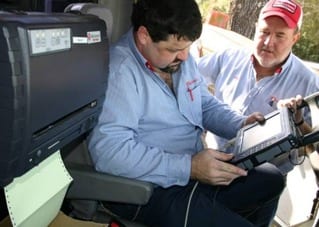
Source: RuggedTabletPC.com
Mobile devices can be a tremendous boon to a field service organization, but the costs often seem prohibitive and the value can be somewhat opaque. Brent Felker, vice president of DecisionPoint Systems‘ field mobility practice tackled both concerns on a panel at Field Service 2011.
For managers and bean counters alike, the only way to justify paying for and implementing new technology is if tangible monetary gains follow. At the ongoing conference in Chandler, Ariz., the discussion centered on how the latest gadgets aren’t just shiny, expensive toys, but carry some practical value as well. Felker listed the following areas as the biggest benefits from mobile implementation:
Real-time resources — When tied to the back office, tablets and handhelds offer instant visibility into company assets.
Mobile inventory management — Technicians’ vans are essentially moving warehouses, and it’s important to capture all used parts — both to charge customers correctly and to properly restock the vehicle for future calls.
Increasing onsite sales — Mobile devices enable technicians to sell additional products and services, all while providing the transparency needed to avoid customer surprise. In allowing technicians to show the customer the added costs and capture the customer’s signature on the spot, tablets and handhelds are tools that drive extra revenue.
Forced closure of work orders — Gives managers more control over their techs’ workflow by requiring technicians to close work orders before receiving the details of the next job.
Collaboration — “Not all technicians are created equal,” says Felker. Varying skill and experience levels can be negated by tablets and smartphones, which allow technicians to tap into the experience of others in the organization.


Share this: